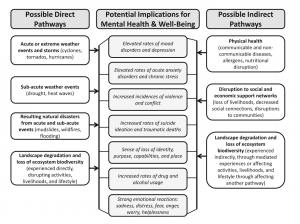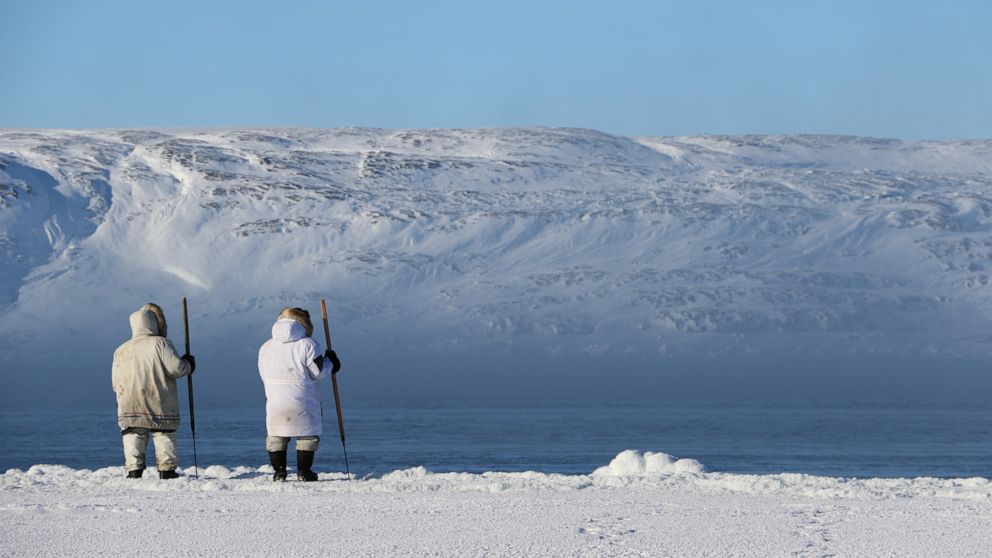All across the Arctic, indigenous communities are facing crises of mental health, but Canadian Inuit communities are among those hit the hardest. With a suicide rate 11 times the international average and up to 10 times higher than the rest of Canada’s, it’s clear that Canadian Inuit communities are hurting.
My research video at the bottom of this page gets into all of the specifics on this, but here is the key overview:
Key Background Details
- Canadian Inuit communities have one of the highest suicide rates in the world, and the youth in these communities are particularly suffering
- Suicide was more or less nonexistent in Inuit communities before contact with western colonizers in Canada
- As climate change worsens, so does mental health for Inuit communities; being “on the land” and feeling connected to their culture through land engagement is key for mental health in the Canadian Inuit. As this graph explains, impacts from climate change can have both direct and indirect impacts on mental health:

Research on the connections between climate change and mental health are still developing, but there is a solid foundation in this field. Check out our “How To Learn More” page for more information!
Limits To Our Knowledge
- Suicide is generally underreported worldwide.
- Legibility is difficult in Arctic regions; data collection in northern Canada is not easy.
- Western notions of “mental health” do not coincide with indigenous understandings of mental health. In fact, the Inuit do not view mental health in the same way Westerners do. This connects to both underreporting and also why this issue might be hard to address.
Traditional Knowledge and Western Notions of Mental Health
- As alluded to above, Inuit notions of mental health do not carry over to Western notions, so forcing western solutions onto Inuit communities will not be productive. The Inuit are much more community-dependent than western societies, and thus the individualistic aspects of western therapy will not be helpful.
-
- Inuit communities focus on cooperative efforts that emphasize community care. The individualism of western psychology doesn’t pair well with the community-oriented approach of traditional knowledge.
- Mental health in Inuit communities is a reflection of society-wide cultural, social, and historical patterns. Mental health and suicide is not an individualized problem in Inuit communities but rather a group one.
-
- Because the Inuit take such a holistic approach to their ‘mental health,’ as is the center of traditional knowledge, they see themselves as part of a system. Therefore, their ‘poor mental health’ is connected to changes in the world and community around them, which means a degrading environment is inherently linked to ‘bad mental health.’
Potential Solutions? Policy Proposals?
key takeaway: Local efforts where community members know what will work best for their people are most successful.
- Local efforts could look a number of ways, such as connections with the community and culture in ways that aren’t based in land, like traditional crafts, music and sports.
- Climate adaptation is a form of suicide prevention. Getting Inuit communities back on and involved with the land can be considered a method for mitigating mental health problems.
- The creation of local youth centers where community members can meet, talk about suicide prevention, and connect with one another.
- All proposals and solutions should be funded by the Canadian government, considering suicide was not an issue until after Canada was colonized.
Watch my lecture on this issue here:
[ensemblevideo version=”5.6.0″ content_type=”video” id=”4afbb991-9b4f-46df-a0ce-032a9d901b30″ width=”848″ height=”480″ displaytitle=”true” autoplay=”false” showcaptions=”false” hidecontrols=”true” displaysharing=”false” displaycaptionsearch=”true” displayattachments=”true” audiopreviewimage=”true” isaudio=”false” displaylinks=”true” displaymetadata=”false” displaydateproduced=”true” displayembedcode=”false” displaydownloadicon=”false” displayviewersreport=”false” embedasthumbnail=”false” displayaxdxs=”false” embedtype=”responsive” forceembedtype=”false” name=”Lily Randall Canadian Inuit youth mental health”]
